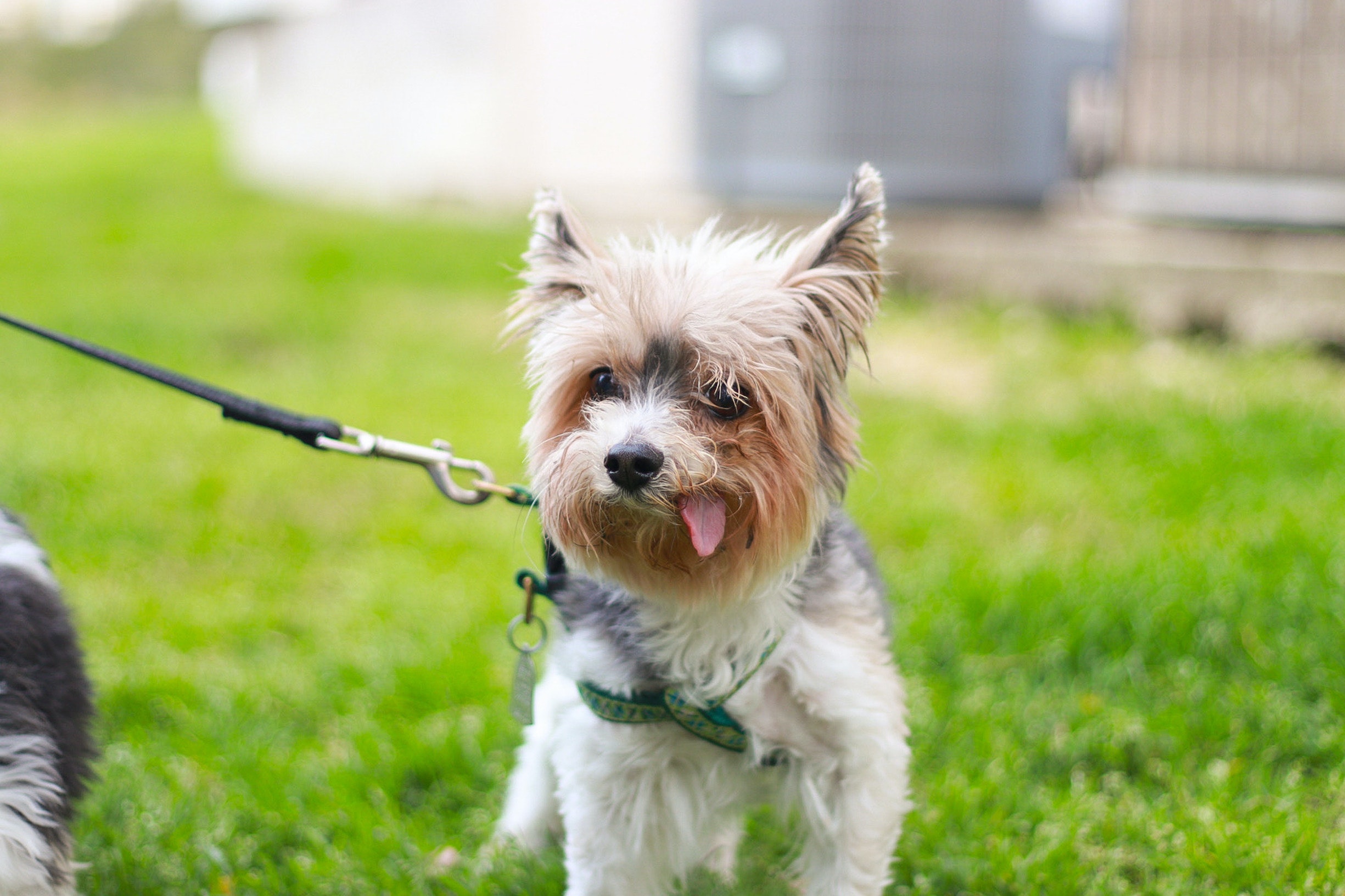
What to Do if Your Adult Yorkie Dog Still Has Its Baby Teeth
If your Yorkie terrier still has its baby teeth, there’s no need to worry. Often, small dogs like Yorkies will retain their baby teeth until their adult teeth come in. This is perfectly normal and nothing to be concerned about.
However, if your Yorkie’s adult teeth come in behind its baby teeth, this could cause problems. The adult teeth may come in crooked or overlapping the baby teeth, which can lead to gum disease or other dental issues. If you notice this happening, it’s best to take your Yorkie to the vet or a professional dog dentist for an evaluation. They can determine the best course of action, which may involve removing the baby teeth or taking other measures to ensure the adult teeth come in correctly.
In general, Yorkies and other small dogs tend to have good dental health overall. However, it’s still important to brush their teeth regularly and take them for checkups with the vet or dog dentist to ensure their teeth stay healthy as they age.
The Yorkie terrier is one of the breeds of dogs that are known to have bad teeth. This is because they have a small mouths, and their teeth are crowded together. This can make it difficult for them to keep their teeth clean and healthy. As a result, Yorkie terriers are more likely to develop dental problems such as gum disease and tooth decay. If you own a Yorkie terrier, it is essential to take good care of their teeth and visit the veterinarian regularly for checkups and cleanings.
Dogs with retained deciduous teeth (commonly called “puppy teeth”) may have a variety of problems. The most common problem is that the adult teeth may come in misaligned, causing crowding and potential problems with chewing.
Additionally, retained deciduous teeth can cause gum disease and tooth decay. In some cases, the adult teeth may erupt behind the deciduous teeth, causing further problems. If your dog has any of these problems, it is important to seek veterinary care. Treatment will vary depending on the individual case, but may include removal of the deciduous teeth, braces, or other dental procedures.
Prevention is always the best medicine, so if you are considering getting a puppy, be sure to ask the breeder about the status of the puppy’s teeth. Regular dental checkups and cleanings by a professional are also important to help keep your dog’s mouth healthy.
Dogs with a genetic predisposition to obesity are at an increased risk of developing the condition. Dogs that are obese are more likely to suffer from health problems such as joint problems, diabetes, and respiratory difficulties.
If you have a dog with a genetic predisposition to obesity, it is important to take steps to prevent the condition from developing. You should feed your dog a healthy diet and make sure they get plenty of exercise. If your dog does become obese, you will need to work with your veterinarian to create a weight loss plan.
As you can see, there are a variety of problems that can arise from retained deciduous teeth in dogs. It is important to be aware of these potential problems and to seek veterinary care if you notice any changes in your dog’s mouth. With proper care, your dog can enjoy a healthy mouth for years to come.
Dental problems are common in dogs, and poor dental hygiene can lead to a variety of health issues. Some dog breeds are more prone to dental problems than others due to their anatomy or other factors. Here are some of the dog breeds with the worst teeth:
–Pugs: Pugs have very short muzzles, which can cause crowding of the teeth and increases the risk of tooth decay and other dental problems.
–Bulldogs: Bulldogs have wide mouths and large jaws, which can cause misalignment of the teeth. This can lead to tartar buildup and gum disease.
–Chihuahuas: Chihuahuas have small mouths and narrow jaws, making it difficult to keep their teeth clean. This can lead to tartar buildup and gum disease.
–Dachshunds: Dachshunds have long bodies and short legs, which can cause their lower jaw to protrude. This can lead to misalignment of the teeth and an increased risk of tooth decay.
–Labradors: Labradors have large mouths and jaws, which can cause overcrowding of the teeth. This can lead to tartar buildup and gum disease.
–Golden Retrievers: Golden Retrievers have large mouths and jaws, which can cause overcrowding of the teeth. This can lead to tartar buildup and gum disease.
–German Shepherds: German Shepherds have large mouths and jaws, which can cause overcrowding of the teeth. This can lead to tartar buildup and gum disease.
Dogs typically have two sets of teeth in their lifetime. The first set of teeth, called “milk teeth,” starts to come in around 3 to 4 weeks old. A dog’s milk teeth should be in by the time they’re 6 to 8 weeks old. Just like human babies, these teeth are eventually replaced with adult ones.
Adult dogs have 42 permanent teeth.
The second set of teeth usually starts coming in when a dog is around 4 to 6 months old. By the time they’re 7 to 9 months old, all of their adult teeth should be in. Some dogs, however, may retain one or more of their baby teeth (deciduous teeth). This is most common with the canine teeth and the premolars located in the back of the mouth.
=> It’s not unusual for a dog to have one or two baby teeth that never fall out. In most cases, this isn’t a cause for concern. However, if your dog has several baby teeth that haven’t fallen out, it’s important to talk to your vet. This can be a sign of an underlying health problem.
=> For the most part, baby teeth aren’t any different from adult teeth. However, there are a few key differences. Baby teeth are typically smaller and more delicate than adult teeth. They also have thinner enamel, which makes them more susceptible to cavities and decay.
=> It’s vital to take care of your dog’s baby teeth, just as you would their adult teeth. This means brushing them regularly with dog-specific toothpaste and taking them to the vet for regular checkups and cleanings.
=> Baby teeth may be small, but they’re essential! Taking care of them now will help ensure that your dog has a healthy mouth for years to come.
A few different dog breeds have been known to have bad breath. These include the Affenpinscher, American Eskimo Dog, Australian Cattle Dog, Basset Hound, and Beagle. While there are several possible causes for bad breath in dogs, one of the most common is periodontal disease.
This condition affects the gums and teeth and can lead to an increase in bacteria in the mouth. Treatment for periodontal disease may include professional cleaning, dental surgery, or antibiotics. Sometimes, bad breath can signify an underlying medical condition such as diabetes or kidney disease. If your dog has bad breath that does not improve with brushing and other at-home care, it is essential to take them to the vet for an evaluation.

Little Yorkies, Big World: A Travel Coloring Book: Travel the world, one Yorkie at a time! (Yorkie Terriers)
Little Yorkies, Big World: A Travel Coloring Book: Travel the world, one Yorkie at a time! (Yorkie Terriers) Little Yorkies, Big World: A Travel Coloring Book: Travel the world, one Yorkie at a time! (Yorkie Terriers) Product Description:Join the little Yorkies on their big world

Celebrate Easter with 3 Free Downloadable Coloring Pages!
Easter is a time for renewal, joy, and spending quality time with family and friends. Here at Yorkie ShoutOuts, we believe that celebrating Easter should be fun and creative—and what better way to do that than with our exclusive collection of free Easter coloring pages!

Yorkie Terrier Coloring Books: Fun & Creative Books for Dog Lovers
Unleash Your Creativity with These Gorgeous Yorkie Terrier Coloring Books! Are you a Yorkie lover looking for a fun and relaxing way to express your creativity? Look no further! Our stunning collection of Yorkie-themed coloring books is perfect for everyone from dog lovers to seasoned








